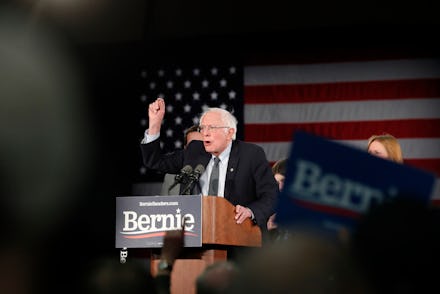Bernie Sanders says Iowa "was not a good night for democracy." He's right

In the wake of Monday night’s snafu at the Iowa caucuses, Vermont Sen. Bernie Sanders is presumably a little frustrated at how things have played out. While the leading progressive presidential hopeful declared Monday that he “had a good feeling” he’d done well in Iowa — when the results of the state’s caucuses were still in flux — he told reporters Tuesday that the previous night of caucuses in the Hawkeye State “was not a good night for democracy.”
The caucuses were thrown into chaos when an app designed for precinct captains to report their tallies to the Iowa Democratic Party reportedly malfunctioned, leading to clogged phone lines and an inability for caucus officials to notify the state party of their results. In the ensuing chaos, every major candidate that was competitive in Iowa essentially delivered a victory speech. Sanders took issue in particular with the way that Pete Buttigeg, the former mayor of South Bend, Indiana, appeared to claim victory in his address to supporters — even as zero precincts had reported their official tallies. “We don’t know all the results,” Buttigieg said Monday in Iowa. “But we know, by the time it’s all said and done, Iowa, you have shocked the nation, because by all indications, we are going on to New Hampshire victorious.”
Buttigieg is one of the leading moderates in the 2020 Democratic race and was thought to be clustered at the top of the Iowa results with Sanders, Massachusetts Sen. Elizabeth Warren, and former Vice President Joe Biden. His proclamation didn’t sit well with Sanders, who was projected by many polls ahead of Monday’s caucusing to be in the lead in Iowa. “I don’t know how anybody declares victory before you have an official statement as to the election results,” Sanders said Tuesday. “So we’re not declaring victory.”
Still, Sanders told reporters Tuesday that he has an “excellent chance to win the Democratic nomination.” To underline the point, his campaign released some internal data from Iowa that showed their candidate in the lead, based on 60% of caucus sites’ results. Jeff Weaver, Sanders’s senior adviser, said in a statement accompanying the numbers: “We recognize that this does not replace the full data from the Iowa Democratic Party, but we believe firmly that our supporters worked too hard for too long to have that work delayed.”
Sanders made sure, while speaking with reporters, not to criticize the underlying vote tallies, only the reporting of the votes. “I think we should all be disappointed in the ability of the party to come up with timely results. But we are not casting aspersions on the votes being cast,” he said, implicitly addressing the rampant conspiracy theories about the delayed results out of Iowa.
The Democratic Party released a partial tally of the votes Tuesday afternoon, publicizing the returns from just 62% of precincts. While the popular vote tally shows Sanders in the lead over Buttigieg by a single percentage point, the former Indiana mayor leads by nearly two percentage points in the delegate totals.
This is only likely to further infuriate Sanders’ supporters, who feel as if the entire botched release has unfairly prevented their favored candidate from claiming victory. After all, Buttigieg might be leading now — but who knows what the remaining 38% of precincts will show? The Iowa Democratic Party additionally didn’t offer details as to which precincts’ results were included in their partial release.
Even with the new data, The Associated Press, which famously calls races once the results are thought to be inalterable, said it was not yet making a ruling on the Iowa caucuses because “there aren’t enough results.” But that likely won’t stop the media from doing that very thing.